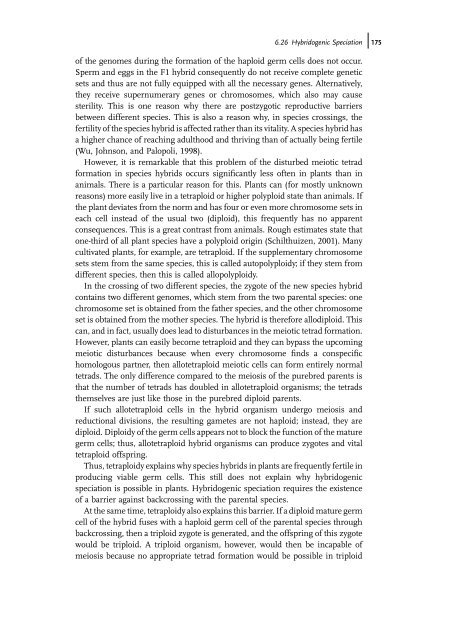Principios de Taxonomia
You also want an ePaper? Increase the reach of your titles
YUMPU automatically turns print PDFs into web optimized ePapers that Google loves.
6.26 Hybridogenic Speciationj175<br />
of the genomes during the formation of the haploid germ cells does not occur.<br />
Sperm and eggs in the F1 hybrid consequently do not receive complete genetic<br />
sets and thus are not fully equipped with all the necessary genes. Alternatively,<br />
they receive supernumerary genes or chromosomes, which also may cause<br />
sterility. This is one reason why there are postzygotic reproductive barriers<br />
between different species. This is also a reason why, in species crossings, the<br />
fertility of the species hybrid is affected rather than its vitality. A species hybrid has<br />
a higher chance of reaching adulthood and thriving than of actually being fertile<br />
(Wu, Johnson, and Palopoli, 1998).<br />
However, it is remarkable that this problem of the disturbed meiotic tetrad<br />
formation in species hybrids occurs significantly less often in plants than in<br />
animals. There is a particular reason for this. Plants can (for mostly unknown<br />
reasons) more easily live in a tetraploid or higher polyploid state than animals. If<br />
the plant <strong>de</strong>viates from the norm and has four or even more chromosome sets in<br />
each cell instead of the usual two (diploid), this frequently has no apparent<br />
consequences. This is a great contrast from animals. Rough estimates state that<br />
one-third of all plant species have a polyploid origin (Schilthuizen, 2001). Many<br />
cultivated plants, for example, are tetraploid. If the supplementary chromosome<br />
sets stem from the same species, this is called autopolyploidy; if they stem from<br />
different species, then this is called allopolyploidy.<br />
In the crossing of two different species, the zygote of the new species hybrid<br />
contains two different genomes, which stem from the two parental species: one<br />
chromosome set is obtained from the father species, and the other chromosome<br />
set is obtained from the mother species. The hybrid is therefore allodiploid. This<br />
can, and in fact, usually does lead to disturbances in the meiotic tetrad formation.<br />
However, plants can easily become tetraploid and they can bypass the upcoming<br />
meiotic disturbances because when every chromosome finds a conspecific<br />
homologous partner, then allotetraploid meiotic cells can form entirely normal<br />
tetrads. The only difference compared to the meiosis of the purebred parents is<br />
that the number of tetrads has doubled in allotetraploid organisms; the tetrads<br />
themselves are just like those in the purebred diploid parents.<br />
If such allotetraploid cells in the hybrid organism un<strong>de</strong>rgo meiosis and<br />
reductional divisions, the resulting gametes are not haploid; instead, they are<br />
diploid. Diploidy of the germ cells appears not to block the function of the mature<br />
germ cells; thus, allotetraploid hybrid organisms can produce zygotes and vital<br />
tetraploid offspring.<br />
Thus, tetraploidy explains why species hybrids in plants are frequently fertile in<br />
producing viable germ cells. This still does not explain why hybridogenic<br />
speciation is possible in plants. Hybridogenic speciation requires the existence<br />
of a barrier against backcrossing with the parental species.<br />
At the same time, tetraploidy also explains this barrier. If a diploid mature germ<br />
cell of the hybrid fuses with a haploid germ cell of the parental species through<br />
backcrossing, then a triploid zygote is generated, and the offspring of this zygote<br />
would be triploid. A triploid organism, however, would then be incapable of<br />
meiosis because no appropriate tetrad formation would be possible in triploid



